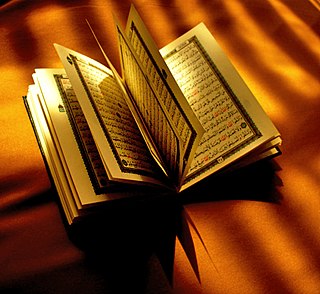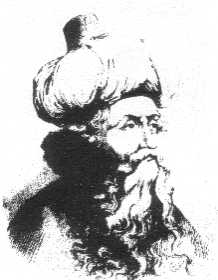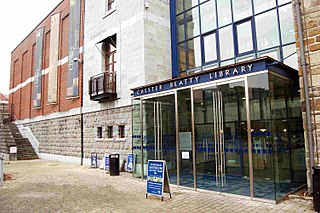External links
| This article about a biographical or autobiographical book on Muslim personalities is a stub. You can help Wikipedia by expanding it. |
History of Mohammedanism is a work by Charles Mills.
This 19th-century book presents a biography of the prophet of Islam, and accounts of the empires founded by Muslims; an inquiry into the theological, moral, and judicial codes of the Islam, and the literature and sciences of the Saracens and Turks; with a view of the present extent and influence of Islam.
One edition was printed in London in 1818, there was also an 1817 version printed.
| This article about a biographical or autobiographical book on Muslim personalities is a stub. You can help Wikipedia by expanding it. |

A book is a medium for recording information in the form of writing and images, typically composed of pages that are bound together and protected by a cover. The technical term for this physical arrangement is codex. A single sheet in a codex is a leaf, and each side of a leaf is a page. In the history of hand-held physical supports for extended written compositions or records, the scroll dominated the written world prior to the codex.

The arabesque is a form of artistic decoration consisting of "surface decorations based on rhythmic linear patterns of scrolling and interlacing foliage, tendrils" or plain lines, often combined with other elements. Another definition is "Foliate ornament, used in the Islamic world, typically using leaves, derived from stylised half-palmettes, which were combined with spiralling stems". It usually consists of a single design which can be 'tiled' or seamlessly repeated as many times as desired. Within the very wide range of Eurasian decorative art that includes motifs matching this basic definition, the term "arabesque" is used consistently as a technical term by art historians to describe only elements of the decoration found in two phases: Islamic art from about the 9th century onwards, and European decorative art from the Renaissance onwards. Interlace and scroll decoration are terms used for most other types of similar patterns.

The Quran, also romanized Qur'an or Koran, is the central religious text of Islam, which Muslims believe to be a revelation from God (Allah). It is widely regarded as the finest work in classical Arabic literature. Slightly shorter than the New Testament, it is organized in 114 chapters — not according to when they were revealed, but according to length of surahs under the guidance of divine revelation. Surah are subdivided into verses.

Printing is a process for reproducing text and images using a master form or template. The earliest non-paper products involving printing include cylinder seals and objects such as the Cyrus Cylinder and the Cylinders of Nabonidus. The earliest known form of printing as applied to paper was woodblock printing, which appeared in China before 220 AD. Later developments in printing technology include the movable type invented by Bi Sheng around 1040 AD and the printing press invented by Johannes Gutenberg in the 15th century. The technology of printing played a key role in the development of the Renaissance and the scientific revolution, and laid the material basis for the modern knowledge-based economy and the spread of learning to the masses.

Ibn ʿArabi, full name Abū ʿAbd Allāh Muḥammad ibn ʿAlī ibn Muḥammad ibnʿArabī al-Ḥātimī aṭ-Ṭāʾī, was an Arab Andalusian Muslim scholar, mystic, poet, and philosopher, whose works have grown to be very influential beyond the Muslim world. Of the over 800 works which are attributed to him, 100 survive in the original manuscript. His cosmological teachings became the dominant worldview in many parts of the Islamic world.

The Chester Beatty is a museum and library in Dublin. Formerly known as the Chester Beatty Library, it was established in Ireland in 1950, to house the collections of mining magnate, Sir Alfred Chester Beatty. The present museum, on the grounds of Dublin Castle, opened on 7 February 2000, the 125th anniversary of Beatty's birth and was named European Museum of the Year in 2002.

The National Post is a Canadian English-language newspaper. The paper is the flagship publication of Postmedia Network, and is published Tuesdays through Saturdays. It was founded in 1998 by Conrad Black. Once distributed nationally, it later began publishing a daily edition in the provinces of Ontario, Quebec, Alberta and British Columbia, with only its weekend edition available in Manitoba and Saskatchewan. As of 2006, the Post is no longer distributed in Canada's Atlantic provinces and the territories.

Obverse and its opposite, reverse, refer to the two flat faces of coins and some other two-sided objects, including paper money, flags, seals, medals, drawings, old master prints and other works of art, and printed fabrics. In this usage, obverse means the front face of the object and reverse means the back face. The obverse of a coin is commonly called heads, because it often depicts the head of a prominent person, and the reverse tails.

Ifrit, also spelled as efreet, efrite, ifreet, afreet, afrite and afrit is a powerful type of demon in Islamic mythology. The Afarit are often associated with the underworld and also identified with the spirit of the dead and had been compared to evil genii loci in European culture. In Quran, hadith and Mi'raj narrations the term appears always followed by the phrase among the jinn. Only in folklore they developed into independent entities, identified as powerful demons or spirits of the dead, inhabiting desolate places on the surface, such as ruins and temples. Nevertheless, their true habitat remains the underworld.

Farag Foda was a prominent Egyptian professor, writer, columnist, and human rights activist. He was assassinated on 8 June 1992 by members of the Islamist group El Gama'a El Islamya after being accused of blasphemy by a committee of clerics (ulama) at al-Azhar. Foda was one of 202 people killed by "politically motivated assaults" in Egypt between March 1992 and September 1993. In December 1992, his collected works were banned.

Taqwa is an Islamic term for being conscious and cognizant of God, of truth, of the rational reality, "piety, fear of God". It is often found in the Quran. Al-Muttaqin refers to those who practice taqwa, or in the words of Ibn Abbas -- "believers who avoid Shirk with Allah and who work in His obedience."

An-Nisāʼ is the fourth chapter (sūrah) of the Quran, with 176 verses (āyāt). The title derives from the numerous references to women throughout the chapter, including verses 34 and 127-130.
Ahmed Hoosen Deedat was a South African writer and public speaker of Indian descent. He was best known as a Muslim missionary, who held numerous inter-religious public debates with evangelical Christians, as well as video lectures on Islam, Christianity, and the Bible. Deedat established the IPCI, an international Islamic missionary organisation, and wrote several widely distributed booklets on Islam and Christianity. He was awarded the King Faisal International Prize in 1986 for his fifty years of missionary work. He wrote and lectured in English.

Bilal ibn Rabah al-Habashi also known as Bilal ibn Rabah, was one of the most trusted and loyal Sahabah (companions) of the Islamic prophet Muhammad. He was born in Mecca and is considered as the first mu'azzin, chosen by Muhammad himself. He was a former slave of Ethiopian ancestry. Bilal ibn Rabah was known for his beautiful voice with which he called people to their prayers. He died in 640, at the age of 57.

Women in the Quran are important characters and subjects of discussion in the stories and morals taught in Islam. Some of them are portrayed in a positive light, while others are condemned for their actions. Mary is the only woman mentioned in the Quran by name. The others' names come from different traditions. Most of the women in the Quran are represented as either the mothers or wives of leaders or prophets. They retained a certain amount of autonomy from men in some respects; for example, the Quran describes women who converted to Islam before their husbands or women who took an independent oath of allegiance to Muhammad.
Islam is an Abrahamic, monotheistic religion teaching that there is only one God (Allah), and that Muhammad is a messenger of God. It is the world's second-largest religion with over 1.9 billion followers or 24.4% of the world's population, commonly known as Muslims. Muslims make up a majority of the population in 50 countries. Islam teaches that God is merciful, all-powerful, and unique, and has guided mankind through prophets, revealed scriptures and natural signs. The primary scriptures of Islam are the Quran, believed to be the verbatim word of God, and the teachings and normative examples of Muhammad.

The Department of Asia in the British Museum holds one of the largest collections of historical objects from Asia. These collections comprise over 75,000 objects covering the material culture of the Asian continent, and dating from the Neolithic age up to the present day.

Throughout history, women in Jordan's political, social and economic status has varied based on the legal, traditional, cultural and religious values at the time. The current legal framework which is based on European civil code is coupled with Islamic tradition and Shari'a Law has determined the rights and liberties legally granted to women while traditional ideas about masculinity and femininity seem to determine women's access to education, the workplace and the general public sphere.
Abu Nu`aym al-Isfahani was a medieval Persian Muslim scholar. Born in Buwayhid era Isfahan, he travelled widely, visiting Nishapur, Basra, Kufa, Baghdad, Mecca and Andalusia. He is the presumed author of Hilyat al-awliya' , one of the most important sources for the early development of Sufism, and a transmitter of Shafi'i hadith. He was considered one of the best hadith authorities by his contemporary Khatib al-Baghdadi and by Dhahabi and Taqi al-Din al-Subki.
Islamic Extremism is any form of Islam that opposes "democracy, the rule of law, individual liberty and mutual respect and tolerance of different faiths and beliefs." These extreme beliefs have led to radical actions in the past across the Middle East, and Egypt itself has a long history of these radical and extreme sects of Islam with roots dating back to around 660 CE. Islamic extremism in Egypt has been the cause of much terrorism and controversy in the country in the 20th century, and still continues to be a main issue in the current Egyptian society. The main conflict between Islamic extremists and the government officials throughout history stems from two major issues: “the formation of the modern nation-state and the political and cultural debate over its ideological direction.”